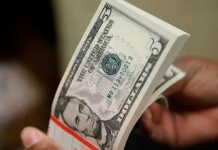China has revealed plans to impose retaliatory tariffs on US imports worth $60 billion (£46bn), firing the latest volley in the mounting trade dispute between the world’s two largest economies.
Signaling the nation’s readiness to respond to the higher tariffs threatened by Donald Trump on $200bn of Chinese imports, officials in Beijing said countermeasures were ready and waiting for the next move from Washington.
The Chinese finance ministry said 5,207 goods imported from the US could be subjected to the fresh tariffs, with levies ranging from 5% to 25% on products including aircraft, soya bean oil, smoked beef, coffee and flour.
The move comes after Trump asked US trade officials to consider imposing a 25% tariff on $200bn of Chinese goods, up from the 10% level originally proposed last month, as the two countries attempt to reach an agreement on trade. China said at the time blackmail would not work and that it would hit back.
Speaking just hours after China unveiled the counter- measures on Friday, Larry Kudlow, Trump’s chief economic adviser, said the US president was willing to follow through with his threats, in a stark warning to Beijing.
Calling the Chinese economy weak from the lawn of the White House in an interview with Bloomberg TV, Kudlow said: “The president has said time and again, that targeted tariffs are going to be part of the game plan with China – unless, and until, they begin to meet our requests, and so far they have not.
“They better not underestimate President Trump’s determination to follow through on our asks.”
The latest exchanges in the mounting trade war between America and some of its biggest trading partners, including China, the EU, Canada and Mexico, comes amid early signs of damage for the world economy.
The Bank of England said on Thursday protectionist trade policies were beginning to have an adverse impact, most notably on indicators of global goods trade. Growth in factory output has begun slowing across advanced economies, while business leaders fear further escalation.
The Chinese yuan was on track to complete its eighth weekly decline on Friday, its longest losing streak in 25 years. While that could signal investors pulling money from the country, it could also help Chinese exporters manage the impact of higher US import tariffs.
Washington had already imposed import tariffs on $34bn of Chinese goods last month, with Beijing immediately retaliating. According to Reuters, the Chinese commerce minister said in a statement after the latest round of tariff threats that the US had “repeatedly escalated the situation against the interests of both enterprises and consumers”.
The minister added: “China has to take necessary countermeasures to defend its dignity and the interests of its people.”
Trump has accused China of pursuing unfair trading practices and stealing American firms’ intellectual property, while using import tariffs to push Beijing towards renegotiating its trade policy with the US.
The president has also imposed steel and import tariffs on several important trading partners, including the EU, Mexico and Canada, saying they are required to protect American jobs and industry.
Although Kudlow called China intransigent, he said there were hints of both sides being able to get back around the negotiating table. The president’s chief economic adviser also revealed there would be a “number of announcements” over the next 30 days covering trade deals with the EU.
While Trump has threatened to put import tariffs on European cars, Kudlow said the president’s recent trans-Atlantic visit had led to constructive talks with the EU.
“[We will] begin the process of a grand deal to tear down barriers and open up markets [with the EU],” he said.













